#not quite as Compelling as mars red (in terms of plot)
Explore tagged Tumblr posts
Text
well i was planning to write out more thoughts on the first ep after waking up but it turns out this is still the only one i have
that is the most breedable blond man i have seen in a while
#someone needs to knock him uppppppppp#i'm trying to remember what else i did think throughout the ep lol#the early parts especially had an almost theatrical quality imo which i really enjoyed#(though maybe i only think that because i know of the plays)#(i'm not familiar with the source material beyond knowing it exists)#enjoying the vibe/atmosphere overall so far#looove dali's cv morita masakazu that is my guy!!#my ichigo! my barnaby! my i forgot his name but the fruitcake from k love that guy too!#however. HOWEVER#god every line dali speaks just oozes ''i should be voiced by toriumi kousuke'' to me#NOT complaining about the casting at all i do not think it's bad!! but this just sounds like such a torichan character to me. anyway#the art. the character design. THE MOUTHS LMAO I WAS LIKE#i have SEEN these mouths before i KNOW it#checked out the show character designer's credits and yes it was skate-leading stars#well look at that i guess i did have some thoughts after all#anyway this was unironically my most anticipated show of the season lol and it's very enjoyable so far#not (yet) as banging and ridiculous as my beloved visual prison#not quite as Compelling as mars red (in terms of plot)#like so far i care much more about seeing the babysitting aspects than the actual murder mystery#but yeah overall tl;dr nice first ep gerhard should be pregnant
73 notes
·
View notes
Link


Blue Planet is a compelling RPG journey into humanity’s precarious future on a distant waterworld where political unrest and a hungry alien ecology threaten the nascent colony effort. A planet where GEO marshals struggle to maintain peace, Incorporate mercenaries wage amphibious proxy wars, and native insurgents fight for their adopted world. A frontier where human desperation and corporate greed ravage an uncanny ecology, threatening to plunge humanity into a war of survival with an ancient, alien legacy.
Though the original Blue Planet predates many of these titles, the setting is evoked by the movies Avatar, Blade Runner and Outland, the television series The Expanse, Firefly and Earth II and the books Legacy of Heorot, Songs of Distant Earth and the Mars Trilogy. A reviewer once gave a glib but accurate elevator pitch for Blue Planet as "Space marshal Cowboy and his cybernetic dolphin sidekick fight eco-crimes in alien Hawaii."
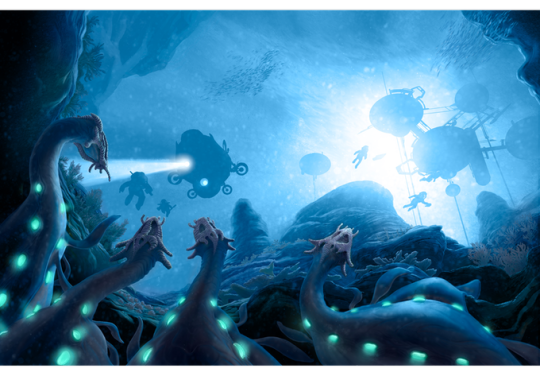
The Full Premise
Blue Planet's uniqueness and enduring appeal are in its deep, realistic, hard science fiction setting, and to really describe it requires more than a few sentences. For those new to the waterworld, we recommend exploring the more detailed premise here.

This campaign will fund the production of a new third edition of the critically acclaimed Blue Planet roleplaying game. We’ve brought Blue Planet to Kickstarter because we're excited to make the definitive edition of the game, but we need your help to do that.
We want to design a uniquely beautiful, full-color, two-volume, 600-page masterpiece, overflowing with evocative art, captivating text, and exceptional production values. We want to make the books themselves works of art with UV cover highlights, endpaper maps and page-marking ribbons. We want to fill them with a new rules set, stunning art, expansive color maps and compelling new locations, social structures, future technologies and alien secrets.
These features and content exceed our capacity to resource on our own, so we are here asking you to join the Blue Planet team and help us make the new version of this classic game truly exceptional.
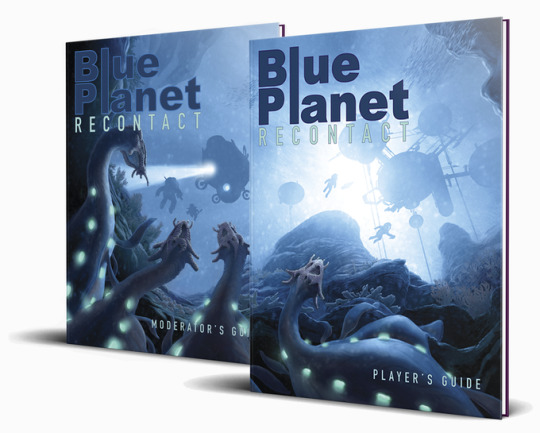
Download the Blue Planet: Recontact Quickstart Guide here. This 80+ page, full color primer is free and contains the new version of the rules, a setting sampler and a demo scenario called "Trouble in Paradise," complete with ready-to-play characters.
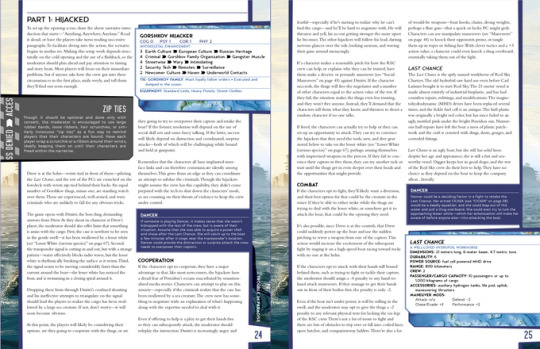

The Recontact project includes
• An extensive evolution of the core mechanics, taking advantage of two decades of RPG development. The new system can be found here in our free, 80+ page Recontact primer.
• All new, full-color artwork bringing the waterworld to life in stunning, evocative imagery.
• Full-color world and regional maps, including submarine geography, redesigned and rendered by professional cartographer and game designer Mark Richardson (Green Hat Design).
• A series of campaign archetypes to help moderators jumpstart their games in the vast adventure space of Poseidon (see below).
• Updated speculative technologies.
• New sociopolitical systems, organizations, institutions and conflicts.
• New locations, settlements and facilities.
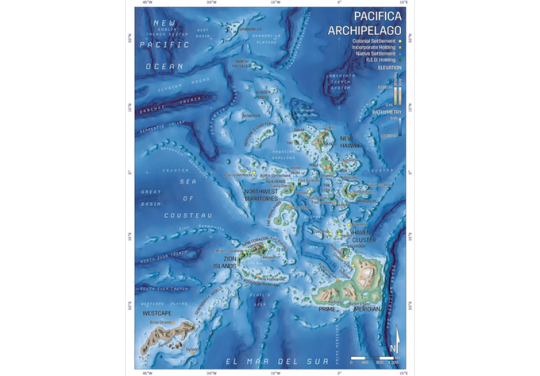
The Recontact project does not include
• Fundamental changes to the core sociopolitical tensions - the themes will remain staunchly pro-environmental and anti-colonial.
• Timeline advancements - the setting was originally - and intentionally - poised on a sociopolitical precipice, rife with plot and storytelling potential, and we want to maintain that same narrative tension.
• Global rewrites of the setting material - though updates, sensitivity edits and additions are being made throughout, we believe Blue Planet’s deep setting is why the game has endured, and so we are not making major alterations to that essential content.
A word about the delivery date
We know a reward delivery date of October 2022 seems unexpectedly far away. Though we intend to deliver Blue Planet sooner, our experience, and the last year in particular, have proven an essential truth about Kickstarter management - set a generous delivery date, then add six months. We hope this date does not discourage folks from becoming backers, but instead demonstrates our commitment to realistic planning and transparent communication.

All reward tiers (digital and physical) will receive PDFs of the out-of-print Blue Planet books the day after the campaign ends. Single book pledges will receive the corresponding v2 PDF, and book set pledges will receive copies of everything ever published for the line. All 10 past Blue Planet titles - over 1700 pages of waterworld adventure - as immediate rewards!
First edition Blue Planet, Archipelago, Access Denied, v2 Blue Planet Player's and Moderator's Guides, Fluid Mechanics, First Colony, Frontier Justice, Natural Selection and Ancient Echoes.
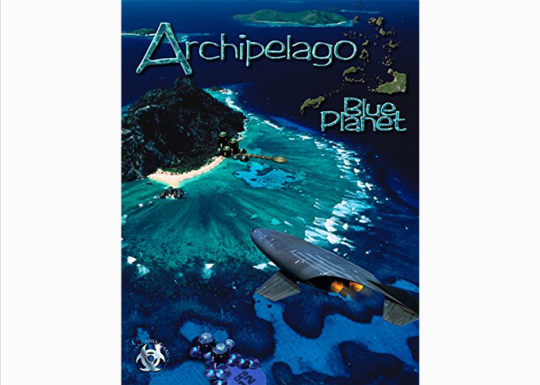

Blue Planet has received broad acclaim, particularly for its deep, detailed, and realistic setting, and has remained well regarded since its original publication. However, that publication was almost 25 years ago, and in the intervening decades, all versions have gone out of print and game design has evolved dramatically. We are therefore excited at the prospect of giving the game system an overdue overhaul and the opportunity to share Blue Planet with a new generation of players.
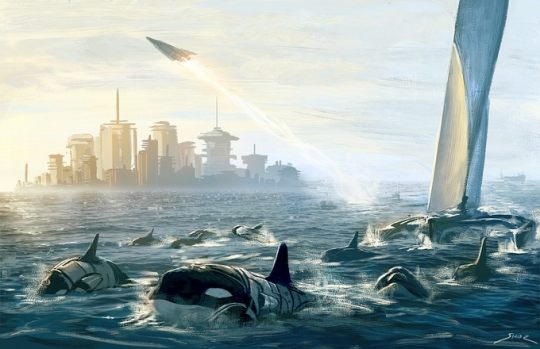
More personally, Blue Planet features critical environmental themes, presenting a precarious future threatened by the dire consequences of ecological collapse. If issues like biodiversity loss, ocean acidification and climate change were only obscure concerns within the scientific community 25 years ago, they are now clear and present existential threats to the human species. This new edition will let us add our own small voice to those demanding true stewardship of our original blue planet.
Compelled by these reasons, the original creators at Biohazard Games have teamed up with publisher Gallant Knight Games to produce a modern edition of this classic RPG.
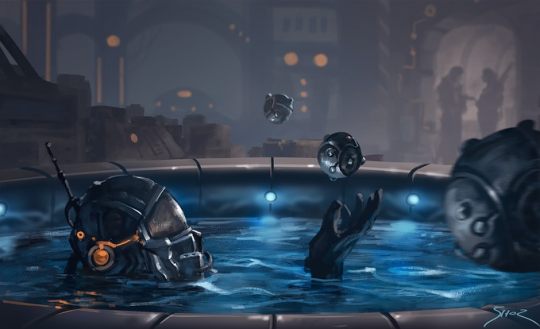
Recontact is the in-game term for the fateful day in 2165 when the UNSS Admiral Robert Perry entered orbit around Poseidon, “reestablishing contact” with Earth 69 years after the original colonists were abandoned. Given that more than two decades have passed since the publication of the first edition of Blue Planet, RECONTACT seemed a fitting subtitle for this new version of the game.

Anyone familiar with Blue Planet v2’s Synergy rules will recognize the new system as a modern evolution of those mechanics, sharing a little of that design's genetics and the same intent to support the hard science realism of the setting. Players will also find the new system is simultaneously simpler and more robust, while supporting richer, more evocative character creation that's focused as much on who characters are as what characters can do.
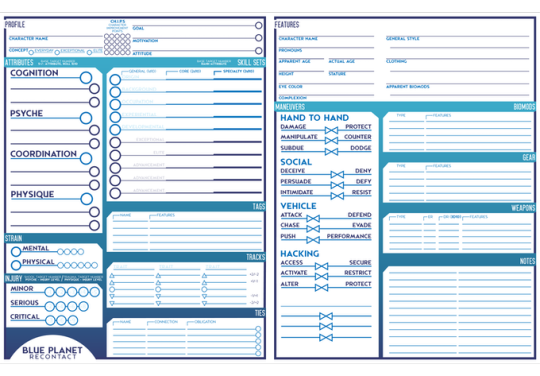
Characters have 4 attributes with optional foci and up to 8 skill sets - areas of expertise based on player-generated descriptors that evoke a character’s origins, training, occupation and experiences. The core mechanic is roll ≤ (attribute rank)+(skill set rank). The roll is made with either 1, 2 or 3 d10, depending upon whether the general, core or specialty in a given skill set is being used. For those who know v2, these elements should seem familiar. There are fewer attributes, but they work similarly, and the variable dice pool is a streamlined take on the aptitude mechanic. The skill sets are simultaneously simpler and more robust than the long list of specific aptitudes and skills in the 2nd edition.
Blue Planet does remain a realistically dangerous game, keeping the wound levels and trauma tests from the 2nd edition. Weapons and sea monsters are therefore quite deadly, so characters should try to avoid getting shot. Or eaten.
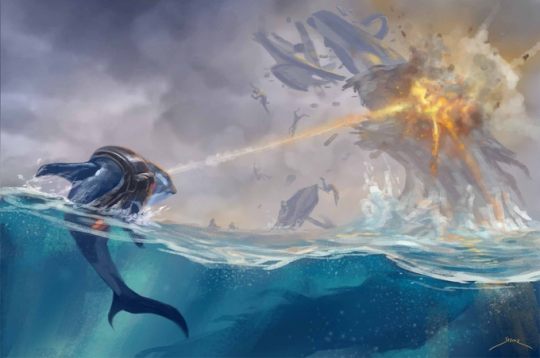
The new mechanics also lean in to the qualitative roleplaying aspects of modern character design, providing Tags, Tracks and Ties unique to each player's character concept and each moderator's campaign. The emphasis is as much on who a character is as what they can do.
Tags are specific consequences, benefits, convictions, motivations or other active descriptors that a character incurs during their adventures - generally the result of narrative events, important tests, fallout from interactions with other characters and injuries.
Tracks model the range of specific character emotions, attitudes and mental states. They are usually campaign or party specific and can be offered by the moderator or created by the players for their party or their individual characters.
Ties describe a character’s primary relationships, identifying the people and organizations to whom the character is connected, as well as the nature of the obligations they must meet to maintain those relationships.

The only consistent criticism Blue Planet has received over the years is that the setting is so vast and wide open, it’s often challenging for game moderators to know where to start. They struggle to choose a single campaign current from among the sea of ideas in the setting. Blue Planet: Recontact will therefore provide a diverse set of campaign archetypes to provide ready-made options for GMs new to the game.
It’s common practice for RPG books to present a range of character archetypes, providing players with detailed examples of the kinds of PCs available to play. These campaign archetypes are similar in that they offer guidance for a variety of different adventure types that can be run in the world of Blue Planet, providing GMs with starting points, directions and enough details to get a variety of different campaigns underway. Each archetype outlines a premise, PC suggestions, unique NPCs, key locations, resources, themes, and plot threads from which a GM can build their perfect Blue Planet campaign.
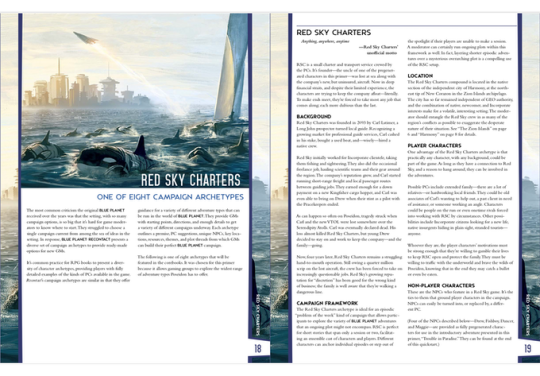
Read the full first example - Red Sky Charters - in the Recontact Primer here.
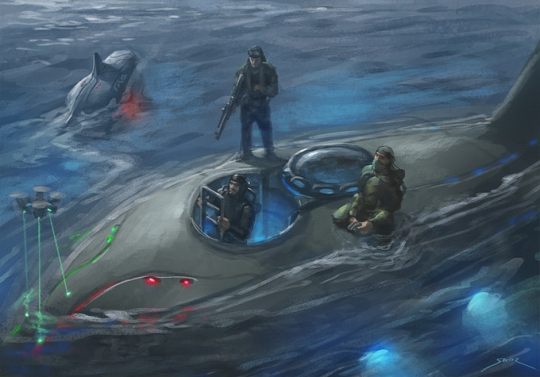
Kickstarter campaign ends: Wed, May 5 2021 3:00 AM BST
Website: [Biohazard Games] [Biohazard twitter] [Gallant Knight Games] [Gallant Knight twitter]
28 notes
·
View notes
Text
All the books I read in 2020, reviewed in two sentences or less
My 2020 in reading was, naturally, a little strange. I had lots of long pauses, did a bad job of keeping track of everything I read, used an e-reader for the first time, and read more for work than I usually do.
So these may not be in strict chronological order as they usually are, and there may be a few missing, but here’s the list, as per tradition:
Rising Tide - John M. Barry: This history of the Mississippi floods of 1927 and the resulting changes in how the US deals with natural disasters is one of those stories about how politics and personality can become a part of the concrete world, and essential for understanding the racial dynamics of disaster response. Well-told, and worth reading.
The Consultant's Calling - Geoffrey M. Bellman: A very useful recommendation from a trusted friend that now has a long-term spot in my office shelf. This book isn't only about consulting, it also offers great thoughts about finding your place and impact in organizations in general.
Range - John Epstein: I think Range is the nonfiction book that had the second- greatest impact on my thinking about myself this year (stay tuned for number 1!): I've always approached my professional and political work as a generalist, and for a long time I felt like that approach was leading me to a dead end. Reading this convinced me that I could be effective and even more useful with my fingers in a lot of different pies, and nudged me to keep searching for my most effective place in the movement.
The Accusation - Bandi: A harrowing work of realist fiction from North Korea that shows the toll authoritarian hero-worship takes on the soul.
The Underground Railroad - Colson Whitehead: I found that the quality of The Underground Railroad did not quite match its notoriety. It felt like two books awkwardly joined, where the more grounded approach to the emotional and interpersonal stakes of slavery and freedom was attached to a poorly-explored fantasy device.
Maus - Art Spiegelman: So much more than a book about the Holocaust, Maus is about parents and how pain is handed down between generations.
I Love Dick - Chris Kraus: After a long enough time, it becomes hard to evaluate books that are meant as a provocation as well as storytelling, but even 20 years on, it's not hard to see why I Love Dick brought us so much of the style and voice of feminist writing on the internet. A unique, itchy, sticky piece of work.
Bloodchild - Octavia Butler: Whenever I see an Octavia Butler book in a used book store, I buy it. This collection of short stories is a fantastic example for what transgressive, visionary speculative fiction should aspire to.
King Leopold's Ghost - Adam Hochschild: What I love about this book and the other I've read by Hochschild (Bury the Chains_ is that he very carefully merges deep explorations of systems of violence with the way that they can be undone by the people who participate in them. King Leopold's Ghost is as much about Belgium's murderous plunder of the Congo as it is about the successful global movement against it.
Priory of the Orange Tree - Samantha Shannon: Priory of the Orange Tree is built on a strong foundation, melding Eastern and Western dragon stories into one universe, but couldn't seem to tie all of its threads together in a compelling way by the end.
Desiring the Kingdom - James K. A. Smith: Smith's point about meaning and desire being embedded in every day practices is a valuable one, but I think I may be just too far outside of his target audience of religious teachers and thinkers to get the most out of his explorations here.
City of Brass, Kingdom of Copper, Empire of Gold (The Daevabad Trilogy) - S. A. Chakraborty: This series is exceptional, and some of my favorite books of any kind that I read this year; I certainly think I recommended them more often than anything else I read in 2020. A high fantasy built on Islamic and Arab cultural iconography, the characters are insightfully developed, the world building grows with precise pacing, and the themes of intergenerational trauma, and sectarianism are handled with expert delicacy.
Leadership and the New Science - Meg Wheatley: While I appreciate the effort to apply metaphors developed from scientific paradigm shifts to provoke paradigm shifts of thinking in other areas of work, I think this book strains its chosen metaphors a bit too far to be useful.
The American Civil War: A Military History - John Keegan: I appreciate that there's a value to these kinds of military analyses of conflicts, but I found this book's neutral tone - and sometimes admiring takes - towards the Confederacy off-putting. Two things I did take from it: the outcome of the war was not certain at the beginning, and speed is truly a critical part of winning conflicts.
To Purge This Land with Blood - Stephen Oates: This was the first substantial reading I had ever done about John Brown, and Oates' book made it very clear why he is still one of the American historical figures most worth talking about today. The contradictions, complexities, and unimpeachable truths caught up in his raids are almost too many to name, but I think he is one of the people most worth thinking about when considering what actually changes the world.
Normal People - Sally Rooney: Anyone who denies that this book is anything less than a truly great novel is not telling the truth, or does not actually care about the feelings people feel. It is a work of keen emotional observation, and perfect, tender language, as well as a pleasingly dirty book -- and there is nothing I would change about it.
Conversations With Friends - Sally Rooney: Still a banger, I think Conversations with Friends struggles somewhat to get to its point, and has less of the pleasing depth and ambiguity of Normal People. Still worth your time and attention, I think.
The Glass Hotel - Emily St. John Mandel: I loved Station Eleven, and I can't imagine having to follow it up, and I unfortunately think The Glass Hotel doesn't quite accomplish all it set out to do. It wandered, hung up on a few strong images, but never progressed towards a point that needed to be made, and I finished it feeling underwhelmed.
The Water Dancer - Ta-Nehisi Coates: Coates is an essential nonfiction writer who can turn a phrase to make devastating, memorable points - but I thought his novel failed to do very many of the things that make his nonfiction great.
A Visit From The Goon Squad - Jennifer Egan: Someone once recommended this book to me as a way to study voice in character development - it is certainly that, as well as a brutally efficient window into hope, fame, and aging.
Trick Mirror - Jia Tolentino: The best parts of Trick Mirror show why Jia Tolentino is one of the writers most worth reading today: she knows how to find the experiences and people that wormhole you into dimensions of American culture that you might not otherwise think carefully about. While I think some of the essays in the book are weaker than her usual work, overall it is still terrific, and her essay on Houston rap, evangelical culture, and drugs is one of the best anythings I read all year.
My Dark Vanessa - Kate Elizabeth Russell: I feel like I'm on very shaky ground making any definitive takes about a book like this that is so fundamentally about gendered violence and what it means to be a victim of that violence. But I will say that I think it's important to recognize how power and charisma can be used to make you want something that actually hollows out your soul.
Prozac Nation - Elizabeth Wurtzel: Without a doubt, this is the nonfiction book that had the greatest personal impact on my life in 2020, and I have much longer things I've written about it that I will probably never share. While I've not ever been to the extremes she describes here, Wurtzel describes so many things that I clearly remember feeling that the shock of recognition still hasn't worn off.
The New Jim Crow - Michelle Alexander: In truth, we should all be shaking with rage at the American justice system every single day. This is certainly not the only book to explain why, but it does a particularly good job of explaining both the deep roots, and rapid expansion of the system we need to dismantle.
The Martians - Kim Stanley Robinson: Getting another little taste of the world Robinson built in the Mars Trilogy only made me want to drop everything and read them again. Well-made, but not stand-alone short stories that are worth reading if you've finished the novels and aren't ready to leave the formally-Red yet.
The Wind’s Twelve Quarters - Ursula K. Le Guin: One of the things that makes Le Guin so special is the sparseness of her prose and world building, and her genius is very much evident in her short stories.
Matter - Iain M. Banks: This is the second Culture series book I've read by Banks, and once again I thought it was inventive, satisfyingly plotted, but not so heady to be imposing. A very solid read.
Ogilvy On Advertising - David Ogilvy and Ogilvy On Advertising in the Digital Age - Miles Young: The original Ogilvy on Advertising is frustratingly smug but at least delivers plain and persuasive versions of advertising first principles. Ogilvy on Advertising in the Digital Age is also frustratingly smug, but is mainly useful as an example of the hubris and narcissism of contemporary advertising executives.
Goodbye to the Low Profile - Herb Schmertz: Schmertz was the longtime public affairs director for Mobil Oil, and in this book he talks about how they worked to manage public debate about the oil industry, without realizing that he's writing a confession. Reading this it is abundantly clear how the oil industry's commitment to making deception respectable led to the collapse of the American public sphere.
The Lean Startup - Eric Ries: I was surprised by how much I liked this book, and wish more people who wanted to start political projects would read it. The Lean method is a way of building organizations that are ruthlessly focused on serving their base of supporters, and evaluate their work against real results - and I think we all could use more of those.
Zero To One - Peter Thiel: Another book that reads like a confession when perhaps not intended to, Zero To One's main point is that the point of building businesses should be to build monopolies, and that competition is actually bad. A great starting point for understanding what's gone wrong in America's tech economy.
The Mother of All Questions - Rebecca Solnit: Of the many things to cherish about Solnit as a writer, the one I needed most when I re-read this book is her ability to gently but doggedly show other ways of imagining the world, and ourselves in it.
Native Speaker - Chang-Rae Lee: I think this is the third time I've read this novel, and the time I've enjoyed it the least: somehow on re-re-reading, the core metaphors became overbearing and over-used, and the plot and characters thinner.
Song of Achilles - Madeline Miller: There are several excellent entries in the sub-genre of classic tales re-told from the perspective of silent women characters, but this is the first I've read re-told from a man's perspective - in this case, the likely-lover of Achilles in the Iliad, Patroclus. While not necessarily a groundbreaking work of literature, it is a very well-executed one that tells a compelling story about how violence can destroy men who carry it out.
Uprooted - Naomi Novik: What makes Uprooted so engrossing is that its magical world feels grounded, and political: magic has consequences for the individuals who use it, and further consequences based on their place in the world. What makes it frustrating is the overwhelming number of things the author has happening in the story, and the difficulty they have bringing them to a conclusion.
3 notes
·
View notes